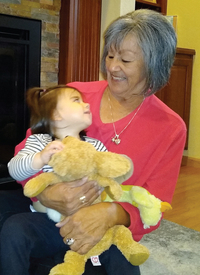Concern for a friend experiencing a difficult recovery during the pandemic got one Yankton woman more than she bargained for.
The friend was recovering from a serious health-related event after collapsing at her apartment prior to the arrival of the novel coronavirus in the United States last spring, Patricia Grant told Her Voice.
“She was in a nursing home for months of therapy,” Grant said adding that the woman had very few visitors.
“I went to see her.”
By mid-March, the COVID shutdown in South Dakota began. By the end of March, the friend was back home with a walker, at first, and, later, a cane, Grant said.
“She couldn’t drive, so she was stuck at home,” Grant said. “I would pick her up and take her out west of the dam to go deer sighting. We counted the deer we saw out there.”
This “deer hunting” expedition, as the two women called it, became a regular activity, each drive lasting about 90 minutes, she said.
When the global coronavirus pandemic began, the rides continued.
One day, Grant said her friend began complaining of an extreme headache.
“Go in and get tested for COVID-19, that’s one of the symptoms,” Grant told her. “She says, ‘No, no, it went away. I’m fine.’
A fews days later on their drive, the woman complained of nausea, Grant said.
“She said, ‘But I think it’s something I ate. I feel better.’ I said,
‘That’s two symptoms you’ve told me now for COVID-19,” Grant said.
On the next drive, the woman showed signs of having developed a dry cough, Grant said.
“‘You need to go in and get tested,’ I said. ‘That is the third symptom in two weeks,’” Grant recalled, adding that the woman refused to consider being tested for COVID.
About a week later, as part of a routine screening requirement prior to a hospital test, the woman was tested for COVID-19.
“That was Friday and that day, or Saturday we went ‘deer hunting’ again in the car,” Grant said. “I enjoyed taking her out. Watching her get excited when she’d see a deer first.”
Days later, Grant found out her friend had tested positive at her hospital visit.
“My heart fell to the floor because I had my great granddaughter on Saturday and Sunday,” Grant said.
“I said, ‘Now I am exposed because of you. You should have let me know right off the bat when you got the results back,’” Grant said. “I said, ‘and you should have been tested a long time ago. This could have been prevented.’”
A call to the woman’s family confirmed that she had tested positive, and that her family had also been after her to get tested.
As Grant embarked on her own COVID-19 testing journey, she heard that her friend was running errands during quarantine, she said.
However, to Grant, the damage was done.
“She knew that I babysat my great granddaughter, who’s only 15 months old,” Grant said. “I was so scared. It was horrible. I couldn’t sleep. I couldn’t eat until I got a test.”
Grant told the rest of the family that she had been exposed to the coronavirus, and isolated herself until she got her test results.
“There are other great grandparents on my little great granddaughter’s other side of the family,” Grant said. “They were scared after I told them.”
Also, she was told that the test was too traumatic for a 15-month-old, so her great granddaughter could not be tested, even if it turned out that she had been exposed.
“I spent all day calling everywhere to see if they would test asymptomatics,” Grant said. “Finally, I called the Indian hospital in Wagner and they said, ‘Yes.’”
Grant learned that it took two hours to run each test and that 21 tests were performed that day, so it would be a while before she got her results.
That evening, she was informed that she had tested negative.
Her family was safe from COVID-19, at least for the time being.
Grant got a call from her acquaintance the following week about resuming their deer-sighting expeditions, but the long drives in the car together were over, Grant decided.



